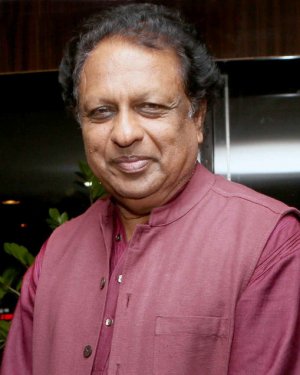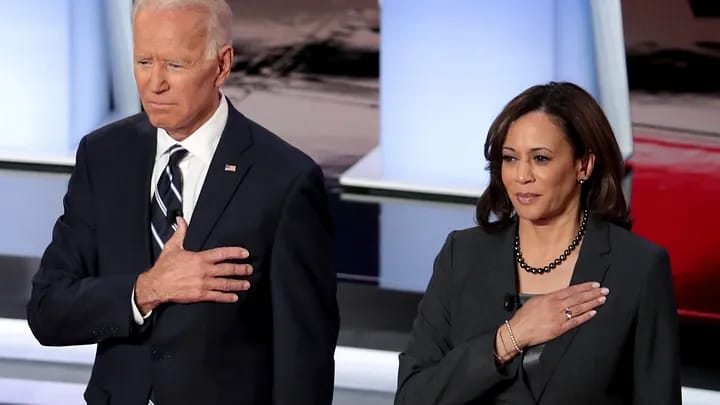
Indian Dilemma In US Elections
IJoe Biden and Kamala Harris|File photo
I
The opinion of Indians in India or in the US will make no difference to the outcome of the elections in the US. The winner has to secure electoral votes, not even just the popular vote
Those of us in India have no vote and the Indian origin voters do not have the numbers either to contribute significantly to the popular vote or to swing the votes in battleground states.
But the way we are, we express our opinions regardless and even believe that they will have an impact on the elections.
I remember a senior colleague of mine admonishing me for speculating about a Trump victory in 2016. When I said that I neither had a vote or an iota of influence on the electorate, he said that we should not see, hear or speak evil lest it should misguide someone.
When PM Modi said at “Howdy Modi” that the Trump government would return to power, it was a long time ago, long before Trump committed his two cardinal sins of mismanaging the COVID-19 pandemic and not doing enough to apply the healing touch to the racial conflict, which arose after the murder of George Floyd.
Both these disasters happened after Trump was feted in India with pomp and show. Poetic justice demands that Trump should atone for his sins and for a politician it will have to be in terms of loss of votes and even defeat in the elections.
Though PM Modi did not regret his backing Trump at the time of his visit to the US, he faces a dilemma whether he should revise his assessment. In 2016, we were on the losing side and there might be some anxiety not to be caught on the wrong foot again.
Joe Biden shines in contrast to Donald Trump, but as Vice President, he did not do anything spectacular for India. Perhaps, there was no opportunity because Barack Obama pursued his own vision of India except for the period between 2010 and 2014 when India-US relations were in a trough because of the preoccupations of the UPA II government.
As the Presidential candidate, Biden has already asserted that he was a supporter of the India-US nuclear deal and a champion of good relations with India. Moreover, he said that he had worked with India to deal with the major global challenges like development and climate change. He stressed the importance of the Indian diaspora and recalled that he was in favour of continuing H1B visas and other immigration measures that would strengthen the Indian diaspora in the US.
The big attraction of Biden is that he is the antidote of Trump in how he sees America and what he values about it. In his choice of a running mate, he hammered home the contrast. He chose a woman, a black, with Indian and Jamaican blood, a fierce fighter for freedom and democracy.
Her Indian blood or her distinctly Indian evocative name, Kamala, which means lotus, was only a minor factor in her choice. What mattered was her standing as a Senator from California, her proven championship of freedom, her rejection of Trumpian politics and the way she demolished the likes of William Barr at the Senate hearings.
Biden’s words on the Indian Independence Day were music to the ears of India when he pledged that, if he is elected, he will stand with India as it faced challenges in the region and along its borders, (read China and Pakistan) and also have honest conversations with India. He would expand two-way trade that opens markets cooperate with India in facing global challenges like climate change.
Even more importantly, he offered his sympathies to those who had been the victims of hate crimes and those impacted by Trump’s sudden and harmful temporary suspension of H-1B visas. “While it sometimes may not feel like the America of your dreams, we will overcome and build back better than ever,” he said.
Harris conveyed the same sentiments separately after recalling her Indian roots and values, including love for good idlis and walks on the Besant Nagar beach. “Biden believes there can be no tolerance for terrorism in South Asia—cross-border or otherwise. A Biden administration will also work with India to support a rules-based and stable India-Pacific region in which no country, including China is able to threaten its neighbours with impunity.”
In other words, the Democratic platform is not lacking in anything that the Republicans have on offer. On the other hand, there is a clear advantage on the issue of immigration.
There comes the dilemma for India. After a period of uncertainty and unpredictability, the Trump administration has stabilised in favour of India because of the COVID day adventures of China and Iran.
Mike Pompeo has emerged as the prophet of a new India-US relationship and Jaishankar is on such good terms with the Americans to be able to advise them.
Former National Security Advisor Shivshankar Menon has said, “Since Trump took office, Washington’s relations with New Delhi have gone from strength to strength. US-Indian defense and intelligence cooperation has reached new heights, and the two countries have anchored their work on maritime security in new agreements. Bilateral trade has grown steadily. At a personal level, the relationship between Modi and Trump is, in the words of India’s foreign ministry, one of “friendship”, “mutual esteem” and “exceptional warmth.”
Though he has added that this is a risky gamble because “the very policies that create comity in the short run are eroding the foundations that will stabilise it over the long run”, the present situation is rosy.
It is by no means certain that the Biden-Harris duo will do better than Trump, as the indications are that the Democrats have a tendency to preach rather than practice and to hyphenate relationships. All indications are that they are likely to strike a balance rather than deals, as Trump appears to do.
But the Democrats are likely to go back to the traditional postures of the United States as a global leader with stable allies in Europe and elsewhere without leaving a vacuum for China to fill.
Although Kamala Harris holds out no promise to be pro-India, many Indian Americans will rally around her as an insurance for the future. Biden is supposed to have raised a fortune in election contributions within a day after Harris’ nomination.
Indian Americans have traditionally been cash cows for politicians on either side of the aisle. The India caucuses in the House and the Senate are peopled with politicians who have benefited from Indian American largesse. South Asians for Trump and Biden are already on the campaign trails. It is customary for the leaders of the South Asian groups to lobby with the Indian government for their respective candidates.
Fortunately, India’s preference for one party or another at this stage is of no consequence. Our work will begin in January 2021 when we have to deal with the new dispensation with all the challenges of the post-COVID era.
There are not many fundamental issues to be resolved between the two democracies after the nuclear deal and India’s membership of most of the control regimes. On defense and security also, firm foundations have been laid, with the Quadrilateral as a basis.
Issues like trade, environment, education and health have their own dynamics and are subject to negotiations. Of course, there will be dangers and imponderables all the way, but these cannot be anticipated or prevented.
Any administration in the US or elsewhere will act in its own interests and, if anything, cultural links with other countries might inhibit rather than encourage special consideration.

